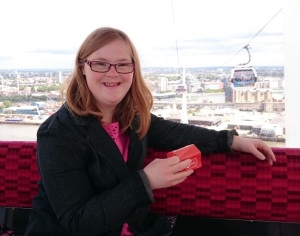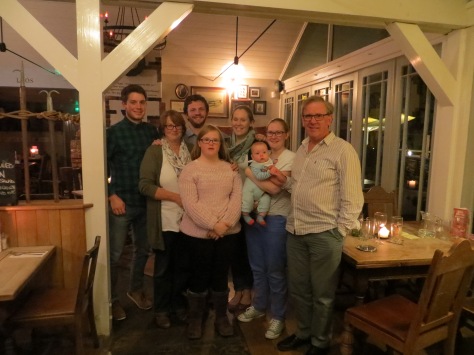“When I meet you for the first time and the conversation turns to our children, don’t be sad when I tell you my daughter has Down’s syndrome, be interested, ask questions. I celebrate every aspect of my daughter – her sense of humour, her compassion, her blonde hair, her beauty, her ability, her drumming, her faith and her extra chromosome.”
When Alice was born, the rather hamfisted doctor had two alternating phrases which he seemed to need to repeat, on a loop, until it reached the point where I thought my husband was very likely to thump him! Those phrases were “Don’t feel guilty” (I certainly didn’t) and “I’m sorry”. Sadly he didn’t mean he was sorry for being so inept at passing on unexpected news, he meant he was sorry that our baby had Down’s syndrome. What a terrible thing to say. There we were, with our beautiful new-born daughter and he was saying he was sorry – what’s more, he was sorry about Alice. I wasn’t. How can anyone be sorry or sad about the arrival of a tiny baby, a new life, a miracle?
When my second eldest daughter was born, 8 weeks prem, a lot smaller than she should have been and clinging onto life by her finger tips no-one said how sorry they were, no-one gave me a list of health problems she was going to have. Yet, they did when Alice was born. And for the record, she didn’t have any of them, but Kate did and those that she didn’t have the other two did! But not Alice.
Is it human nature to react with a long, sad face and words of commiseration when faced with differences? I don’t know, but I do know that it happens. We moved house last summer, to a completely different part of the country, so I find myself meeting new people on a regular basis. Inevitably, we end up talking about our families and children and on several occasions, when I’ve talked about my youngest daughter and dropped into conversation the fact that she has Down’s syndrome, that person has stopped, looked taken aback and said “Oh, I am sorry” or “that’s a shame”. I have to hold back from asking “Why?” in a slightly belligerant tone, trying to stick with “Please don’t be sorry” and diving in with a bit of education! What’s worse, I’ve had at lease one person make such comments when Alice (now 19) was in earshot!
Many people don’t react like this. Many people are supportive and positive and some people if they don’t know what to say, quite sensibly don’t say anything!
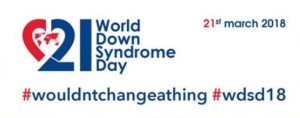
Today is World Down Syndrome Day. It is 2018 and people with Down’s are more visible than ever. Everyone is different, including people with Down’s syndrome and everyone, also including people with Down’s syndrome, has a place in our society. However, the news that someone is expecting a baby with Down’s syndrome is still so often greeted with shock and horror and sadly, still met with an expectation that the only thing to do is ensure that baby isn’t born. When a baby with Down’s is born, parents are still (but not always) met with hushed tones, sad faces and negative attitudes – it’s a BABY for goodness sake, babies are wonderful!
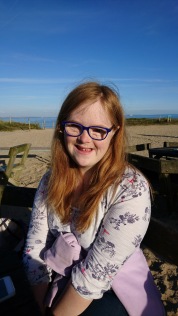
I have a plea, whenever you meet someone who has a baby, child or adult offspring who just happens to have Down’s syndrome, don’t be sad, don’t express regret, be interested, listen, ask questions and above all, be positive.
Happy World Down Syndrome Day!

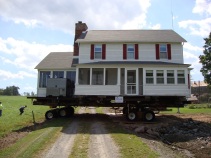 So the choices are huge, small, never-ending and threatening to be overwhelming. Where shall we live? How rural? How on earth do we decide what out of our huge amount of accumulated stuff can be ditched? (And how can I possibly be expected to decide which books should go?) When do we put the house on the market? Which church will we choose? Where will Alice (17-year-old who has Down’s Syndrome) go to college? I am already getting so bemused by all of this that when my husband asked me where I wanted to go for a dog walk this afternoon, I almost burst into tears! Stop asking me to make decisions! (Apart from the chocolate one, the chocolate one is a very easy decision, closely followed by the “Glass of wine?” one!)
So the choices are huge, small, never-ending and threatening to be overwhelming. Where shall we live? How rural? How on earth do we decide what out of our huge amount of accumulated stuff can be ditched? (And how can I possibly be expected to decide which books should go?) When do we put the house on the market? Which church will we choose? Where will Alice (17-year-old who has Down’s Syndrome) go to college? I am already getting so bemused by all of this that when my husband asked me where I wanted to go for a dog walk this afternoon, I almost burst into tears! Stop asking me to make decisions! (Apart from the chocolate one, the chocolate one is a very easy decision, closely followed by the “Glass of wine?” one!)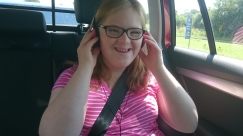 I know that having a child with additional needs is no bed of roses and I also know that we are fortunate that Alice doesn’t face as many challenges as some do. I know that some people feel that they just couldn’t cope and I would never judge anyone, but it is absolutely imperative that such massive choices are made based on the best information possible – we owe that to everyone involved.
I know that having a child with additional needs is no bed of roses and I also know that we are fortunate that Alice doesn’t face as many challenges as some do. I know that some people feel that they just couldn’t cope and I would never judge anyone, but it is absolutely imperative that such massive choices are made based on the best information possible – we owe that to everyone involved.
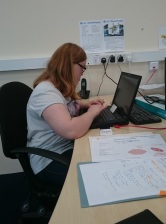 many people see it as such a problem that, offered a straightforward blood test with no risk to the baby, they will not hesitate to take it and terminate – the figure quoted on the radio was an extra 90 terminations a year. What really worries me is that I heard a paediatrician quoted this morning as saying “we have a duty to make sure parents are aware of all the likely problems”, then going on to list them at some length. Yes, but you also have a duty to give parents-to-be a balanced view, to make sure that they also understand that it is likely that their child will go to mainstream pre-school and school, will learn to read and write, will have friends, will drive their parents mad with whatever the latest Disney film is and will have a great life. In order to make such a huge decision, parents have to have all the relevant information, positive and negative.
many people see it as such a problem that, offered a straightforward blood test with no risk to the baby, they will not hesitate to take it and terminate – the figure quoted on the radio was an extra 90 terminations a year. What really worries me is that I heard a paediatrician quoted this morning as saying “we have a duty to make sure parents are aware of all the likely problems”, then going on to list them at some length. Yes, but you also have a duty to give parents-to-be a balanced view, to make sure that they also understand that it is likely that their child will go to mainstream pre-school and school, will learn to read and write, will have friends, will drive their parents mad with whatever the latest Disney film is and will have a great life. In order to make such a huge decision, parents have to have all the relevant information, positive and negative.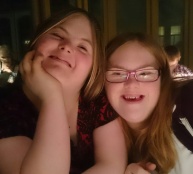 r best friend also has Down’s syndrome and they have a fantastic time. We all choose friends who are like us, on the same level, who enjoy the same things, so that seems entirely natural to me.
r best friend also has Down’s syndrome and they have a fantastic time. We all choose friends who are like us, on the same level, who enjoy the same things, so that seems entirely natural to me.